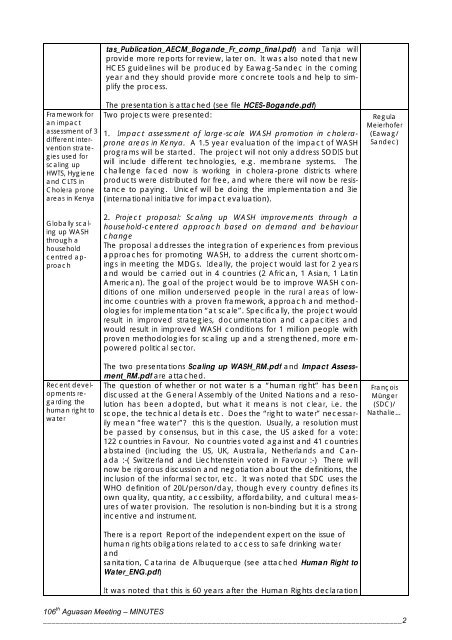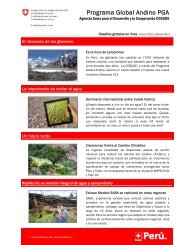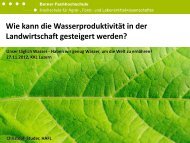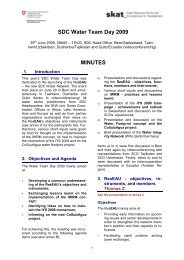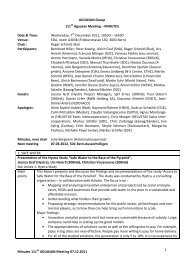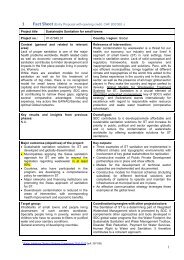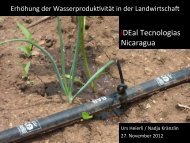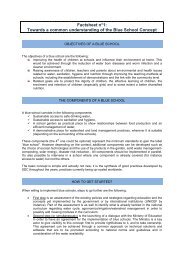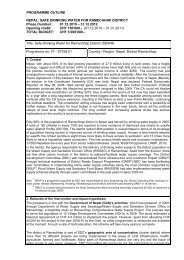106th Aguasan Meeting – MINUTES - SDC Water Network
106th Aguasan Meeting – MINUTES - SDC Water Network
106th Aguasan Meeting – MINUTES - SDC Water Network
Create successful ePaper yourself
Turn your PDF publications into a flip-book with our unique Google optimized e-Paper software.
tas_Publication_AECM_Bogande_Fr_comp_final.pdf) and Tanja will<br />
provide more reports for review, later on. It was also noted that new<br />
HCES guidelines will be produced by Eawag-Sandec in the coming<br />
year and they should provide more concrete tools and help to simplify<br />
the process.<br />
Framework for<br />
an impact<br />
assessment of 3<br />
different intervention<br />
strategies<br />
used for<br />
scaling up<br />
HWTS, Hygiene<br />
and CLTS in<br />
Cholera prone<br />
areas in Kenya<br />
The presentation is attached (see file HCES-Bogande.pdf)<br />
Two projects were presented:<br />
1. Impact assessment of large-scale WASH promotion in choleraprone<br />
areas in Kenya. A 1.5 year evaluation of the impact of WASH<br />
programs will be started. The project will not only address SODIS but<br />
will include different technologies, e.g. membrane systems. The<br />
challenge faced now is working in cholera-prone districts where<br />
products were distributed for free, and where there will now be resistance<br />
to paying. Unicef will be doing the implementation and 3ie<br />
(international initiative for impact evaluation).<br />
Regula<br />
Meierhofer<br />
(Eawag/<br />
Sandec)<br />
Globally scaling<br />
up WASH<br />
through a<br />
household<br />
centred approach<br />
Recent developments<br />
regarding<br />
the<br />
human right to<br />
water<br />
2. Project proposal: Scaling up WASH improvements through a<br />
household-centered approach based on demand and behaviour<br />
change<br />
The proposal addresses the integration of experiences from previous<br />
approaches for promoting WASH, to address the current shortcomings<br />
in meeting the MDGs. Ideally, the project would last for 2 years<br />
and would be carried out in 4 countries (2 African, 1 Asian, 1 Latin<br />
American). The goal of the project would be to improve WASH conditions<br />
of one million underserved people in the rural areas of lowincome<br />
countries with a proven framework, approach and methodologies<br />
for implementation “at scale”. Specifically, the project would<br />
result in improved strategies, documentation and capacities and<br />
would result in improved WASH conditions for 1 million people with<br />
proven methodologies for scaling up and a strengthened, more empowered<br />
political sector.<br />
The two presentations Scaling up WASH_RM.pdf and Impact Assessment_RM.pdf<br />
are attached.<br />
The question of whether or not water is a “human right” has been<br />
discussed at the General Assembly of the United Nations and a resolution<br />
has been adopted, but what it means is not clear, i.e. the<br />
scope, the technical details etc. Does the “right to water” necessarily<br />
mean “free water”? this is the question. Usually, a resolution must<br />
be passed by consensus, but in this case, the US asked for a vote:<br />
122 countries in Favour. No countries voted against and 41 countries<br />
abstained (including the US, UK, Australia, Netherlands and Canada<br />
:-( Switzerland and Liechtenstein voted in Favour :-) There will<br />
now be rigorous discussion and negotiation about the definitions, the<br />
inclusion of the informal sector, etc. It was noted that <strong>SDC</strong> uses the<br />
WHO definition of 20L/person/day, though every country defines its<br />
own quality, quantity, accessibility, affordability, and cultural measures<br />
of water provision. The resolution is non-binding but it is a strong<br />
incentive and instrument.<br />
There is a report Report of the independent expert on the issue of<br />
human rights obligations related to access to safe drinking water<br />
and<br />
sanitation, Catarina de Albuquerque (see attached Human Right to<br />
<strong>Water</strong>_ENG.pdf)<br />
It was noted that this is 60 years after the Human Rights declaration<br />
François<br />
Münger<br />
(<strong>SDC</strong>)/<br />
Nathalie…<br />
106 th <strong>Aguasan</strong> <strong>Meeting</strong> <strong>–</strong> <strong>MINUTES</strong><br />
_____________________________________________________________________________________2


